Construction project causes heat spike
October 15, 2018
The past couple of weeks were hot for Warhawks due to a lack of cooling across all facilities on campus. The extra use from the new dormitory at the University of Wisconsin-Whitewater overworked the aging cooling equipment and hindered its capability to equally distribute air conditioning.
To combat the issue in a timely manner, officials in the Facilities Planning and Management Department decided to undergo construction and replace the Chilled Water Plant on campus.
“As excited as we are about the new plant we are receiving, we are equally troubled by the unfortunate weather and our inability to provide the level of service we strive to meet,” said UW-Whitewater’s Power Plant Superintendent, Paul Walton.
While most contractors prefer up to a year to complete installment of a new plant, a completion deadline of six months was set for the process to meet UW-Whitewater’s demands. Walton said he expects the new plant to be completed by April 2019.
Due to the strict timeline and obligatory contracts signed by the Department of Administration, the Central Utility Plant was forced to end production of chilled water Oct. 1, which was fifteen days sooner than normal.
As Whitewater recently experienced unseasonably high temperatures, the Facilities Planning and Management staff took reactive measures in efforts to decrease the impact on campus. These included cutting any unnecessary heat sources and allowing outside air to circulate through buildings.
Staff at Andersen Library Access have been working through the stifling conditions.
“I have always said I like it hot and dry, but there is no ding dong air movement in the library, and this heat is making me crankier than normal,” said Brenda Neumeister Andersen Access Services day supervisor. “I don’t know how the students can stand to be in here when it’s so hot. All I see is puddles of perspiring students, and I honestly feel bad for them trying to study in these conditions.”
Like Neumeister noticed, students have also been struggling to focus in in the hot circumstances.
“The heat makes you feel overwhelmed and less motivated to work on things,” senior Amelia Sigmon said. “I just took a midterm and felt overwhelmed just because I was nervous, but add the heat and it makes you feel even more flustered.”
Two new 2,400-ton chillers will be installed, and one 1,400-ton chiller is expected to still function.
“This will allow us to provide 6,200 tons of cooling to campus,” Walton said. “Also included in this project are sensors that will allow the utility plant staff to see in real time what every building is receiving and returning in chilled water temperatures and flow. This will allow us to insure we have the proper amount of equipment running so we can run the plant as efficiently as possible.”
Walton remains upbeat amid the heat surge. He walked through various buildings on campus to ask people how they felt about the room temperatures.
“We are truly appreciative of the majority of people who have been polite and understanding since we are trying our best to make the situation as optimal as possible,” Walton said. “This is not an event the university or the Central Utility Plant could have prevented. The hope is that when this is complete, Whitewater will be home to one of the most efficient Chilled Water Plants in the state.”













